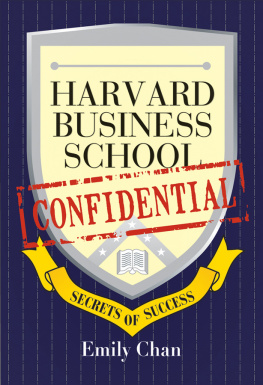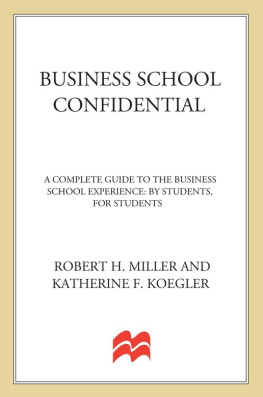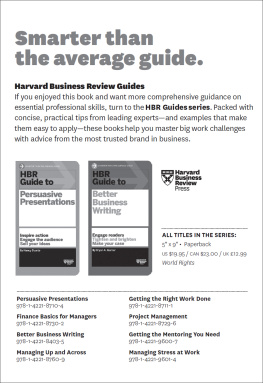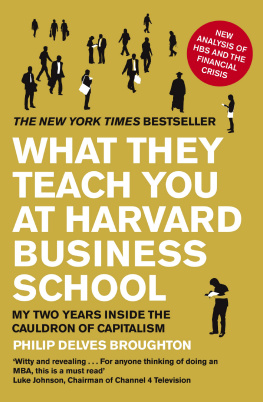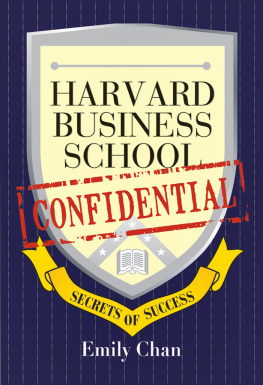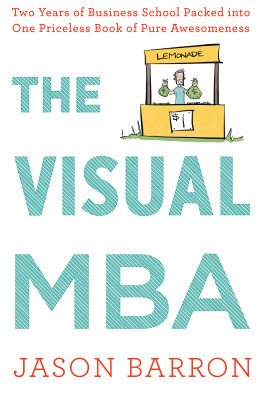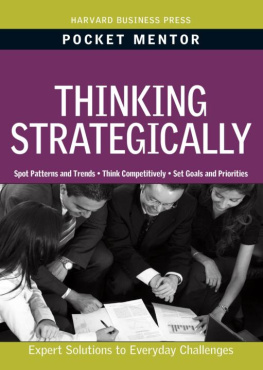Emily Chan - Harvard Business School Confidential
Here you can read online Emily Chan - Harvard Business School Confidential full text of the book (entire story) in english for free. Download pdf and epub, get meaning, cover and reviews about this ebook. year: 2012, publisher: Wiley, genre: Business. Description of the work, (preface) as well as reviews are available. Best literature library LitArk.com created for fans of good reading and offers a wide selection of genres:
Romance novel
Science fiction
Adventure
Detective
Science
History
Home and family
Prose
Art
Politics
Computer
Non-fiction
Religion
Business
Children
Humor
Choose a favorite category and find really read worthwhile books. Enjoy immersion in the world of imagination, feel the emotions of the characters or learn something new for yourself, make an fascinating discovery.
- Book:Harvard Business School Confidential
- Author:
- Publisher:Wiley
- Genre:
- Year:2012
- Rating:3 / 5
- Favourites:Add to favourites
- Your mark:
- 60
- 1
- 2
- 3
- 4
- 5
Harvard Business School Confidential: summary, description and annotation
We offer to read an annotation, description, summary or preface (depends on what the author of the book "Harvard Business School Confidential" wrote himself). If you haven't found the necessary information about the book — write in the comments, we will try to find it.
Harvard Business School is the iconic business school. An admission ticket to HBS is a hot commodity and an HBS degree is highly respected in the business world. This book, written by an HBS grad and seasoned businesswoman, tells you why. It is a distillation of the most valuable and pragmatic but yet easiest to learn concepts taught at HBS.
Harvard Business School Confidential — read online for free the complete book (whole text) full work
Below is the text of the book, divided by pages. System saving the place of the last page read, allows you to conveniently read the book "Harvard Business School Confidential" online for free, without having to search again every time where you left off. Put a bookmark, and you can go to the page where you finished reading at any time.
Font size:
Interval:
Bookmark:

Copyright 2009 John Wiley & Sons (Asia) Pte. Ltd.
Published in 2009 by John Wiley & Sons (Asia) Pte. Ltd.
2 Clementi Loop, #02-01, Singapore 129809
All rights reserved.
No part of this publication may be reproduced, stored in a retrieval system or transmitted in any form or by any means, electronic, mechanical, photocopying, recording, scanning or otherwise, except as expressly permitted by law, without either the prior written permission of the Publisher, or authorization through payment of the appropriate photocopy fee to the Copyright Clearance Center. Requests for permission should be addressed to the Publisher, John Wiley & Sons (Asia) Pte. Ltd., 2 Clementi Loop, #02-01, Singapore 129809, tel: 65-64632400, fax: 65-64646912, e-mail:
This publication is designed to provide accurate and authoritative information in regard to the subject matter covered. It is sold with the understanding that the Publisher is not engaged in rendering professional services. If professional advice or other expert assistance is required, the services of a competent professional person should be sought.
Other Wiley Editorial Offices
John Wiley & Sons, Inc., 111 River Street, Hoboken, NJ 07030, USA
John Wiley & Sons, Ltd., The Atrium, Southern Gate, Chichester, West Sussex P019 8SQ, UK
John Wiley & Sons (Canada), Ltd., 5353 Dundas Street West, Suite 400, Toronto, Ontario M9B 6H8, Canada
JohnWiley & Sons Australia Ltd., 42 McDougall Street, Milton, Queensland 4064, Australia
Wiley-VCH, Boschstrasse 12, D-69469 Weinheim, Germany
Library of Congress Cataloging-in-Publication Data
ISBN: 9780-470-822395
Typeset in 10/13pt JansonText-Roman by Thomson Digital
10 9 8 7 6 5 4 3 2 1
This book is dedicated to my parents, Peter and Amy and my husband, Vincent
Most parents and teachers would tell you: Study hard in school, get a good job, receive a good salary, and live happily ever after. In fact, when I was a senior at Stanford, the only thing my friends could talk about was how to get a good job at a consulting firm or at an investment bank.
There is nothing wrong with getting a good job if you just want a stable life. A good job, by definition, pays well and has good career advancement opportunities. You will save up and eventually will be able to buy a nice place to live in, own a car, and send your kids to school. Although you will most likely always have to be careful with your expenditure to make sure you can pay the mortgage and the school bills, you will still be somewhat comfortable. You will most likely be in the good solid middle or slightly upper middle class.
However, to most Harvard Business School (HBS) students, getting a good job is a means, not an end. HBS students do not think of getting a good job as the ultimate goal for several reasons:
I was one of the earlier employees of a start-up back in the late 1980s. It was very small when I was there. I got some stock options but I did not think much of them as I was not very senior and the value did not seem much. Then I left the company. After the company got listed some years later, I would check the newspaper once in a full moon on the stock price. For years, it always seemed to be about the same level every time I looked. So I would sigh and not pay attention. One day I decided to sell the shares as they were not going anywhere. It was then that I found out the company had had many stock splits over the years and my stocks were worth a lot of money.
(Working for the others) may actually put you at greater risk... Having a single source of income... not being given the opportunity to learn how to make thousands of decisions... decisions you would have mastered if you were self-employed... you are not doing things that are in your own best (economic) interest for you to become successful in terms of becoming wealthy.... You are merely doing what is in the best interest of an employer.
Font size:
Interval:
Bookmark:
Similar books «Harvard Business School Confidential»
Look at similar books to Harvard Business School Confidential. We have selected literature similar in name and meaning in the hope of providing readers with more options to find new, interesting, not yet read works.
Discussion, reviews of the book Harvard Business School Confidential and just readers' own opinions. Leave your comments, write what you think about the work, its meaning or the main characters. Specify what exactly you liked and what you didn't like, and why you think so.

